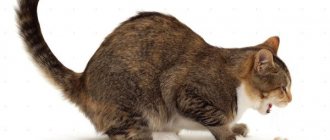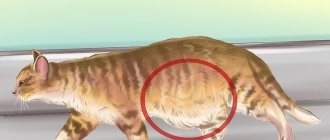Most pet owners do not think about the fact that the animal may be infected with parasites until they find worms in the feces. But much more unpleasant situations also happen, for example, a cat may vomit worms. This happens if the cat is infected with helminths.
The presence of parasites in the body does not have the best effect on the health of cats. Vomiting occurs because the body suffers from excessive intoxication and the cause is helminthic infestation. The presence of worms in the vomit indicates that the animal is severely infested, but can occur after taking an anthelmintic drug. It is possible that the pet has so many parasites that they simply do not fit in the intestines and are already crawling out.
Often, even before a cat vomits worms, their presence in the body is indicated by a number of characteristic symptoms.
The cat vomited worms: 5 reasons
The infestation of animals by parasites is the rule rather than the exception. Pets that do not walk outside are also not immune from helminthiases. Worm eggs and larvae are everywhere: in the ground, crowded places, tap water, food.
Upon contact with outer clothing, shoes, or water, roundworms and nematodes enter the body.
Vomiting of worms is a consequence of a number of reasons:
- Severe worminess. In the absence of anthelmintic prophylaxis, helminths multiply quickly, and the body rejects the excess.
- Intestinal obstruction. An excessive number of worms creates congestion in the digestive organ, disrupting peristalsis.
- Intoxication. Nematodes and Giardia produce toxins. Vomiting is a protective reflex during poisoning; some parasites are released in the vomit.
- Damage to internal organs. Worms cause inflammatory processes in the stomach, liver, even cirrhosis. Reflexive evacuation of stomach contents is one of the symptoms of organ damage.
- Reaction to an anthelmintic drug.
Vomiting is a serious symptom that indicates a serious condition of the animal.
Symptoms of worms in cats and kittens
Common signs of worms in cats are weakness, dull hair, diarrhea or constipation, vomiting, purulent discharge from the eyes, and a swollen, tight abdomen.
A sick cat scratches and chews at the anus, and bad breath may appear. The cat refuses to eat or, conversely, greedily absorbs food, but does not gain weight, but gradually loses weight. Nematodes – infection with roundworms (body shape resembles spaghetti).
Trematodes - infection with flukes
In cats and kittens, two types of worms (helminths) are more common: roundworms and tapeworms.
Roundworms (nematodes) are small worms ranging from 2 mm to several centimeters in length; in severely advanced cases, they can reach more than 10 cm in length; in such cases, cats do not survive. Roundworms live primarily in the small intestine, they feed on the host's blood and can cause life-threatening anemia, especially in kittens. After two weeks from the moment a cat or kitten is infected, worm eggs can be detected in the feces.
How could my cat become infected with worms? This question is especially often asked by owners of cats and kittens who do not let their animals go outside. The answer is simple - raw meat, fish, food from the trash can, as well as flies that are hunted by cats and kittens sitting at home, all this is a breeding ground for worms and various bacteria, which can also include human clothes and shoes. One of the main ways of infection is contact with the feces of infected animals. Cats can also pass worms to their kittens through their milk.
Symptoms of worm infection.
The presence of certain signs of worms in a cat or kitten depends on the degree of damage, in other words, on the number of worms in the body. With a weak invasion (damage), signs of the disease may be absent at all times.
Symptoms may vary depending on the type of worm in cats and kittens. As you already know, there are three types of worms: tapeworms (cestodes), roundworms (nematodes), flat flukes (trematodes).
Small kittens always require special care and supervision. The owner must ensure that the furry baby does not refuse food, is active and always feels good. If a person notices that a pet is feeling sick or vomiting, he needs to find out the cause of this symptom. Frequent and prolonged vomiting in a kitten may indicate the presence of serious diseases, the treatment of which must be started immediately.
The causative agents of helminthiasis are worms of various types and shapes: from 2 mm (pinworm) to 6 m (pork tapeworm).
Little kittens and puppies are adorable little furballs. But your pet’s round and elastic tummy does not always mean that he had a hearty breakfast. Perhaps this is the first sign of worm infection, and in large numbers.
Young children are also susceptible to helminthiasis from pinworms and roundworms. Due to the low protective barriers of the body, infection with worms occurs at lightning speed. Unfortunately, it is difficult to distinguish it from other ailments due to similar symptoms. Pinworm eggs enter the baby's body with poorly washed vegetables and fruits, through dirty hands and from infected pets.
The owner of the dog can detect the problem based on several signs: weight loss, poor appetite, diarrhea. But often all symptoms occur without severe severity due to the dog’s strong immune system.
If a pet refuses to eat, when he has periodic vomiting, and even with worms, then the clock starts counting down.
Inaction is also dangerous because a dog infected with worms can cause other members of the family to immediately become ill with helminthiasis.
Vomiting in cats
Nausea can occur due to improperly selected food, food at low temperatures (up to 38 degrees), or accumulated hair in the stomach.
It is necessary to deworm your pet using special means, which will differ from drugs for dogs or humans. After 2 weeks, it is advisable to repeat the prescribed drug, since after the dead individuals, the place in the intestines will be taken by grown larvae. Folk remedies are also ineffective in treatment.
Vomiting in a person
Worm infestation in humans is a fairly common occurrence, and the owner himself may not be aware of the infection for a long time. Stool analysis rarely detects pinworms, but blood sampling for toxocariasis can detect foreign bodies.
Most often, due to neglect of basic hygiene, after going outside, using the toilet, or before eating, pinworms - helminths from 2 to 12 mm in length - enter the human body.
At night, females crawl out and lay up to 20 thousand eggs per day on the anus. Due to severe itching, a person scratches the skin in this area and the eggs remain under the nails. Subsequently, re-infection with pinworms occurs through the oral cavity.
If a worm infestation is detected in one household or pet, treatment is prescribed for absolutely everyone.
Prevention
Vomiting of helminths indicates that the infestation in a person or animal is already in an advanced form. If you pay attention to the symptoms in time, go to the doctor, carry out therapy and subsequent prevention, you can forget about this unpleasant illness forever.
If your pet starts vomiting and worms are found there, this is a very serious symptom! Urgent consultation and immediate treatment is required!
Many sick cats scratch and chew their anus. At the same time, an unpleasant odor appears from the animal’s mouth. Each animal organism tolerates helminths differently. Some individuals begin to absorb food and do not gain weight, but rather lose it, others refuse to eat, since the slightest ingestion of food into the animal’s body causes vomiting. Paying attention to these symptoms should not immediately make a diagnosis. It is quite possible that this is another disease that is not related to worms.
How do worms come out through vomiting?
The animal's immune system is able to independently resist parasites. Poor nutrition, care, and chronic diseases undermine the defense system, and worms actively multiply.
Once inside, the worms cling to the intestinal microvilli and feed on the juice produced to digest food. A lack of digestive juice disrupts the food processing process. Peristalsis is disrupted, congestion forms, which the kitten’s body tries to get rid of by vomiting. Nematodes and roundworms live mainly in the intestines and come out with the contents of the intestines.
Worm larvae migrate through the intestines into the intrahepatic bile ducts. The secretory function of the liver is impaired. Excess bile enters the blood, cholemia develops, accompanied by vomiting.
Regardless of the type, parasites in the acute phase cause allergies in the host. The immune system intensively produces antigen.
A high concentration of antibodies causes degenerative processes in organs where larvae and adult parasites accumulate. If the digestive system is not functioning well, the remains of undigested food have a toxic effect with manifestations of the gag reflex.
The cat vomited worms: what to do
The presence of parasites in the vomit indicates an advanced form of helminthiasis. The pet must be taken to a veterinarian for examination as soon as possible. The doctor will assess the condition of the predator and, based on the test results, determine what damage has been caused to organs and systems.
The breeder tells the doctor about the pet's behavior in the previous month. A description of the symptoms will help you understand how long the predator has been sick.
Signs of infestation:
- loss of appetite: refusal to eat or, conversely, eating a lot;
- bloated stomach;
- upset stool, frequent diarrhea with a strong odor, constipation;
- decreased activity, drowsiness;
- hair loss;
- allergy symptoms: cough, watery eyes;
- irritability, avoids contact, does not give in to hands;
- rubs and licks the anus.
The doctor will prescribe treatment taking into account the presence of complications. After completing anthelmintic therapy, the doctor will explain how to use the medicine for preventive purposes.
Can worms make a child sick?
Today, helminth infections are very common throughout the world. Thus, diphylobothriasis is often diagnosed in fish lovers, enterobiasis in preschoolers, and trichinosis in hunters.
With a large-scale invasion, a person may experience the following symptoms:
Due to the toxic effects and lack of nutrients, minerals and vitamins, a person infected with helminths has a sharply reduced immunity. During this period, chronic diseases such as sinusitis, vulvovaginitis, sinusitis, vaginosis, etc. may worsen.
But the most common sign of helminthic infestation is a disturbance in the gastrointestinal tract. The following symptoms appear:
But can worms make you sick? Doctors always give an affirmative answer to this question, because helminths disrupt the digestive processes, which leads to the development of such a symptom.
First aid
Severe symptoms may occur in the evening when veterinary clinics are closed.
The pet owner can provide first aid independently.
- The predator is given plain water (not by force). The liquid will help remove residual toxic substances and relieve spasm of the intestinal muscles.
- Refuse to feed, especially dry food. Food provokes attacks of nausea. A predator may choke on pieces of food.
- Sorbents are given to block the action of toxic substances; activated carbon (1 t/kg) or Phosphalugel (0.5-1 mg/kg) are suitable.
As soon as the pet's condition improves, it is taken to the veterinarian.
Drug treatment
Veterinary pharmacies offer a variety of anthelmintic drugs. For severe infestations, treatment is prescribed by a doctor. He selects a remedy based on the disease, clinical picture, and condition of the cat.
Medicines differ in dosage form and methods of administration.
The dosage and treatment regimen are determined by the veterinarian and, if ineffective, adjusted.
| name of the drug | dosage form | dosage | contraindications |
| Drontal | pills | tablet per 4 kg of cat's weight | age up to 21 days, weight less than kg |
| Kanikquantel Plus | tab. | 1/10 kg | up to 3 weeks, pregnancy |
| Milbemax | tab. | 0.5 tab./kg | up to six months, less than 0.5 kg |
| Prazitel | suspension | 1 ml/kg | pregnancy |
| Prazicide | susp. | ml/kg | less than 3 weeks |
| Prasimek-S | pills | 2/2.5 kg | up to 2.5 months, |
| Helmintal K | drops | 0.1 ml/kg | – |
Prevention of helminthiasis
It is impossible to protect your pet from helminth infection 100%, which is why it is important to reduce the risk of parasites in the cat’s body. To do this, it is necessary to regularly give your pet medication for preventive purposes. Many drugs are used to treat and remove parasites from the body and have a good effect. When contacting a veterinary pharmacy, be sure to indicate that the infected pet is an adult cat or a small kitten.
We recommend reading: Baldness in Cats
Prazitel is one of the most effective drugs against worms.
An adult animal is given prophylaxis 2 to 4 times a year. Provided that anthelmintic drugs are used two weeks before mating or scheduled vaccination. The first prophylaxis for kittens is carried out no earlier than 3 weeks after birth. Just like in adults, anthelmintic drugs must be given 14 days before vaccination. Secondary prophylaxis is carried out at 6-8 weeks, the next two times with an interval of three months, and upon reaching six months, the same as for adult cats, from 2 to 4 times a year.
Regular disinfection of the litter tray will accompany prevention. It is also necessary to remove solid excrement from the tray immediately, and not to eat raw meat or fish products as food. Shoes should be stored in closed shoe boxes so that your pet cannot lick them and contract an infection. Any disease is easier to prevent than to cure! Helminthiasis is no exception.
If you find an error, please select a piece of text and press Ctrl+Enter.
The owner should pay attention to the behavior of the pet after using the drugs.
Traditional methods of treatment
Only anthelmintic drugs can cure severe forms of parasitic infestations. But folk recipes will help speed up the healing process. The use of alternative methods is agreed with the doctor.
Medicines used to treat humans can also be given to four-legged animals, only in a smaller dosage.
Home Recipes:
- Garlic. The peeled clove is crushed and added to canned food; you need to make sure that your furry friend has eaten the “medicine”. The procedure is repeated every other day.
- Onion water. Cut the onion into 4 parts with a glass of warm water. The infusion is given to the pet in the morning on an empty stomach for a week.
- Tansy. Pour boiling water (200 ml) over a tablespoon of dried flowers and leave for an hour. The strained infusion is given three times a day (as much as you drink) 30 minutes before meals.
- Fennel decoction. Dill seeds are poured with a glass of water and put on fire. After boiling, cook for 5 minutes, cool and strain. The decoction is poured into the mouth using a spoon or syringe.
During therapy, the condition of the furry friend is monitored.
Can a person get worms from a cat?
Unfortunately yes. During licking, lamblia and roundworm eggs fall through the mouth onto the fur, and from there onto the person’s hands. You can become infected by washing the litter box without gloves. The pet is usually allowed to sleep anywhere. Wool remains on the chair or sofa; upon contact with the surface of the furniture, the larvae get on the skin.
Infection with helminthiasis through contact with a pet is not a reason to abandon the animal. Anthelmintics, which are given to prevent diseases, will help protect your cat from toxoplasmosis and ascariasis.
Symptoms of the presence of parasites in a cat
- Dull color and hair loss.
- Changes in taste preferences and appetite disturbances.
- Lethargy and drowsiness of the pet.
- Dried crusts in the corners of the eyes.
- Stool disorders: constipation, diarrhea.
- Sudden weight loss or excess weight.
- Barrel belly.
- Paleness of the mucous membranes.
- Kittens are delayed in development and growth.
- Signs of general intoxication.
- The presence of parasites in feces and vomit.
What are the dangers of having parasites in cats?
Cats can get 2 types of parasitic worms: tapeworms and roundworms . In addition, they can exist together and coexist perfectly. Most helminths of these groups can settle in humans. A cat infected with helminthiasis poses the greatest risks to small children, who can hardly keep a distance when interacting with the animal. That is, the presence of worms in an animal living in the house creates a high risk of infection for humans.
But not only people feel discomfort if worms appear in their body. The cat is an intelligent creature and also suffers from health problems. Worm infestation in cats can significantly ruin a pet’s life, and in the worst case, lead to death. The cause of fatality when cohabiting with parasites can be the following factors:
- Intestinal obstruction, which can be caused by a large accumulation of worms.
- Poisoning by helminth waste products.
- Exhaustion of the body due to a deficiency of vital substances. Especially in combination with other animal diseases.
What parasites live in cats?
There are many types of parasites that can live in the body of cats. In total there are about 30 species. They are distinguished into flat and round.
Flatworms:
- Tape (cestodes): tapeworms, tapeworms.
- Flukes (trematodes). Infection with trematodes is also called opisthorchiasis.
Roundworms:
- Roundworms.
- Toxocars.
- Nematodes.
- Hookworms.
All types of these parasites can live in the human body. That is why it is simply necessary to find and neutralize helminths in a cat in a timely manner. If a pet is found to be infested with one or another pest, all family members should undergo prevention along with pet therapy. It is advisable to carry out a general cleaning with disinfection of the room and treatment of all things.
What to do, how and how to help?
There are no options; an animal can only be cured of worms with anthelmintic drugs . Most often, several types of parasites coexist in a cat’s body. Therefore, complex broad-spectrum medications should be used for treatment. High-quality drugs rarely have side effects and are quite effective. When using, you should follow the recommendations in the instructions and follow the dosage. The active substance can be in the form of tablets, drops, powders, suspensions.
If an animal suffers from external pests, such as fleas, then first of all you need to get rid of them, and then exterminate the helminths.
Anti-worming medications for cats:
- Pyrantel, Drontal, Parasicil, Kanikvantel, Stronghold, Profender and others.
If the pet is weakened and has other health problems, then it is better to carry out treatment under the supervision of a veterinarian. This is especially true when kittens are sick. Poisoning parasites, if they are in large quantities, can cause intoxication of the animal. Your veterinarian can recommend medications to support your cat and remove toxins after deworming.
What are worms?
Cats can easily pick up a wide variety of E. coli, including worms, which can result in them vomiting.
If a parasite enters an animal’s body, a number of symptoms occur. But there are also cases when there are no symptoms until there are a lot of them in the pet’s body
And a person learns about parasites only when the cat vomits worms. Some species can be easily transmitted from person to animal and vice versa. Therefore, you need to constantly carry out preventive measures for all animals and not forget about yourself.
How to give a cat a deworming tablet?
The droplets are applied to the withers, where the cat cannot reach them when licking. The suspension should be drawn into a syringe in the required amount and released into the pet’s mouth.
If everything is very clear with taking drops and suspensions, then with tablets things are a little different. The owner will need attentiveness and some skill.
- Place the cat next to you, holding the cat by the body with your elbow and the head with your hand.
- Using the hand that holds the cat's head, press lightly at the corners of the mouth until the cat opens its mouth. In this position, fix the animal and put a pre-prepared tablet in its mouth.
- Now hold the cat with one hand and hold the mouth with the other so that the pet does not throw away the medicine. Wait until it swallows.
- When the animal swallows the tablet, it can be released.
- It is imperative to monitor your pet’s condition for a couple of days.
- Carry out the procedure again after 2 weeks.
Worm infestation is not uncommon among domestic animals, and owners often observe their cat vomiting worms. Vomit may contain tapeworms, flukes and other small parasites. This condition is not normal and an urgent visit to a veterinary clinic is required. When white or other worms come out through a cat’s mouth, such a phenomenon is dangerous not only for the health, but also for the life of the pet.
What to do if your cat is vomiting worms
If your pet vomits worms, you should not panic, but you need to take action, because the animal may become intoxicated. First, take your pet to the vet. If a cat eats raw meat or from the owner's table, then there is a high probability that it is worms. These parasites can enter an animal's body in absolutely any way. Especially if the kitten is small, he is curious and climbs everywhere where it is necessary and where it is not necessary.
To avoid such an unpleasant situation, you need to follow some rules:
- Wash the food you give to your pet well to prevent it from vomiting.
- If it is raw meat or fish, then you should first freeze it or pour boiling water over it.
- Be sure to vaccinate your baby, and then everything will be fine.
Every owner must remember that the health of a pet, first of all, depends on himself. Follow all the rules mentioned above and your kitten will never be a carrier of parasites . It is also advisable to have your own veterinarian who can help at any time if necessary. After all, animals, like people, need not only proper nutrition and care, but also regular medical examinations.
We recommend reading: Ear Mites Transmitted from Cats to People
It is often very difficult to determine that a pet has become infected with worms. Owners learn about this disease only after the cat has vomited worms. Some people think that if an animal vomits worms, then they are gone, but, as a rule, this is a mistaken opinion.
Reasons for violation
Cats vomit worms only when they are heavily infested with helminths. A pet vomits long parasites because they are unable to fit in its gastrointestinal tract. Not all helminth infestations cause the cat to regurgitate tapeworms and other helminths. For example, cestodes can remain unattended for a long time, without being accompanied by any clinical picture in kittens and adults. This is due to the fact that such a worm is firmly fixed on the mucous membrane of the gastrointestinal tract and when the intestinal muscles contract, it does not come out either during vomiting or during excretion of feces.
Veterinarians say that even cestodes, if they accumulate in large numbers, can lead to severe vomiting in a cat and discharge of worms from the mouth. But at the same time, such a symptom is provoked by dangerous intoxication, which causes the death of the pet.
A cat also often vomits when infected with trematodes, which can become lodged in the gastrointestinal tract, liver, gallbladder and pancreas. The development of vomiting during helminth infestation occurs as follows:
Roundworms in cats
Roundworms in cats are parasitic in the gastrointestinal tract, but can affect other organs. Diseases caused by roundworms are called “nematodes”. Nematodes have an elongated fusiform body. The sizes of roundworms range from 1 mm to several tens of centimeters. Nematodes are dioecious helminths. Females are usually larger than males.
The development of roundworms, depending on the species, occurs both with and without the participation of an intermediate host. With the feces of the animal, the female nematode releases eggs or larvae, which become invasive in the external environment. Cats become infected through nutritional means by ingesting a helminth egg. A cat infects its kittens when feeding milk.
The most common causes of roundworms in cats are toxocariasis and toxascariasis.
The main source of the disease is infected cats, which excrete Toxocara eggs in their feces and larvae in their milk when feeding. Adult worms parasitize in the small intestine, larvae - in the lungs, bronchi, liver, heart, and muscles.
Kittens have a hard time suffering from the disease. A severe infestation can be fatal when a large number of helminths poison the pet’s body with toxins. The cause of the inevitable death of an animal can be the formation of a “tangle” of worms, which clogs the intestines and causes rupture of its walls.
Toxascariasis most often affects animals older than 6 months. Helminths parasitize in the small intestine, stomach, and sometimes in the bile ducts of the liver and pancreas.
What to do and how to help your pet?
When a cat vomits a white worm, you should not immediately grab it and go to the veterinary clinic. Such sudden movements can lead to the pet simply choking on vomit. You should contact a specialist only after the worm has already come out and the animal no longer regurgitates. After this, you need to collect the vomit along with helminths in a jar or sealed bag. This will make it easier for the veterinarian to determine the source that is causing the cat to vomit, as well as select the necessary medications. Vomit does not pose a danger to humans, but you should still carefully collect its remains. At the same time, they follow the rules of hygiene, perform the manipulation with medical gloves and treat the dirty area with chlorine bleach or a disinfectant.
First aid
When a cat burps white worms, and the owner is unable to take it to a veterinary clinic, then it is possible to help the pet on your own. If the animal is sick and vomits, then it is necessary to give liquid to reduce the irritant effect on the esophageal mucosa and wash away digestive juices. The following steps can also be taken at home to help a cat with parasite vomiting:
- Give your pet anti-worm tablets, as well as activated charcoal. In this way, it is possible to prevent the spread of helminthic toxic substances throughout the cat’s body.
- In the first few hours after vomiting, do not feed the cat, as it may again vomit worms.
Return to contents
Drug treatment
Vomiting with worms requires urgent contact with a veterinarian, who will examine the cat and select the necessary therapeutic actions. If your pet vomits once and thin worms come out, then an anthelmintic drug is prescribed, which fights specifically against a specific type of parasite. When a pet vomits and a white worm or other helminths are detected in the masses, the following medications are prescribed, indicated in the table.
| Group | Medicines |
| Anthelmintics | "Pirantel" |
| "Drontal" | |
| "Parasicil" | |
| "Kanikvantel" | |
| "Stronghold" | |
| "Profender" | |
| Drugs that eliminate intoxication and replenish water balance | Glucose for intravenous administration |
| Ringer's solution |
To stabilize the digestive function of a pet after prolonged vomiting, it is necessary to drink probiotics.
After a cat has vomited a long white worm, it is necessary not only to treat it with medications, but also to monitor its diet. It is important to refuse to eat any food on the first day to prevent your pet from vomiting again. If within 24 hours the cat no longer burps and its condition is satisfactory, then you can give chicken broth or porridge with a liquid consistency. They return to their normal diet no earlier than 3 days after vomiting.
Folk recipes
When a cat regurgitates worms or has severe vomiting, you can use unconventional therapeutic measures, which are previously discussed with a veterinarian. After your pet has vomited, it is recommended to make pumpkin puree. This dish helps stabilize digestive function and alleviate the cat’s condition. This food is fed for 1 tsp. twice a day for 3 days.
It is equally effective to use a decoction of oak bark after vomiting worms. Due to the tanning properties of the main component, the absorption function of the intestine is reduced, which is why fewer toxic substances enter the bloodstream. Tea leaves have the same effect on a cat after vomiting. It needs to be consumed orally, 1 tsp. per day. If the cat is rapidly getting worse, and vomiting interspersed with worms becomes more frequent, then you should not engage in self-treatment, since this can only harm the animal.
Treatment of helminthic infestation in a cat with vomiting with helminths
If a cat vomited worms or worms were found in the animal’s feces, this indicates a helminthic infestation. The more parasites there are in the body, the greater the likelihood of diseases occurring due to poisoning or mechanical damage resulting from the vital activity of helminths. In this case, urgent treatment is required.
If vomiting occurs while taking antihelminthic medications, the pet needs careful monitoring.
Reverse peristalsis (vomiting) indicates a malfunction in the internal organs. The presence of worms in a cat’s feces indicates helminthization of the pet, and, consequently, its toxic poisoning as a result of the vital activity of parasites.
Worms in an animal’s vomit can appear due to:
- excessive worminess of the animal;
- action of anthelmintic drug.
If anthelmintic drugs were not taken, and worms were found in the vomit, then this indicates an overabundance of parasites in the body. In this case, urgent treatment of the animal is necessary. Worms begin to migrate throughout the body, and there is a possibility of their settlement in the liver, kidneys, lungs and even the heart. Then the symptoms include rapid heartbeat, shortness of breath and fatigue.
If the general condition of the animal is assessed as satisfactory, then independent treatment is possible. When symptoms of poisoning or intestinal obstruction are added, therapy is prescribed only by a specialist.
Worm infestation is dangerous because it can provoke:
- severe poisoning;
- mechanical damage to internal organs of varying severity;
- failure of internal organs;
- death of a pet.
Therefore, treatment of the animal must begin immediately. If parasites are suspected of spreading in various organs, it is recommended to do an ultrasound of the blood vessels, liver, kidneys and heart.
First, it is advisable to consult a specialist, since medications have toxic properties, and this will cause a deterioration in the condition of the sick pet.
Without examining an animal's feces, it is impossible to determine the type of parasite, so broad-spectrum medications are used:
- Prazitel. Available in the form of tablets and suspension. Suitable for use in kittens older than 3 weeks. The suspension is given to the animal at the rate of 0.5 ml for every 500 g of weight. One tablet is designed for every 4 kg of animal weight. The drug is taken once a day, repeating the dose after 10 days.
- Milbemax. The tablets are suitable for use in animals older than 6 weeks. The dose is calculated individually based on weight, age and symptoms, so you can use it only after reading the instructions.
- Drontal. The drug is in tablets, intended for use in cats and kittens older than 3 weeks and heavier than 1 kg. For every 2 kg of weight, give half a tablet. The drug is recommended to be used with a small amount of food during morning feeding hours.
Before starting treatment, the animal should be treated for fleas, but the least toxic drugs should be chosen. For constipation, an enema is prescribed before taking anthelmintic drugs.
If for some reason drug treatment is not possible, then you can turn to traditional medicine. Scientists conducted experiments, as a result of which the anthelmintic properties of onions were proven. To prepare onion infusion, pour 1 chopped onion with 1 glass of boiling water and leave for 10–12 hours. The resulting liquid is dripped from a pipette onto the root of the animal’s tongue, 30 ml 3 times a day for 30 minutes. before meals.
Wormwood infusion is also an anthelmintic. To prepare it, brew 1 tablespoon of the herb with 1 glass of boiling water, leave for 30–60, and filter after time. An infected pet should swallow 30 ml of infusion 1 hour before meals 3 times a day.
Treating helminthic infestations in a neglected state using traditional methods is dangerous for the health of the animal. Non-professional treatment is only possible as a last resort.
In order to prevent a kitten from developing a severe form of intestinal infestation, it is important to notice signs of parasite infection in a timely manner. In kittens, as in adult animals, the following are observed:
- deterioration of coat and skin condition;
- refusal of food;
- digestive disorders (constipation, diarrhea, vomiting);
- bloating;
- pallor of mucous membranes;
- weakness.
Also in kittens the following symptoms are added:
- developmental delay;
- blurred vision and uncoordinated movements;
- anemia;
- heart rhythm disturbance;
- bloating against a background of general exhaustion.
Anthelmintic drugs are given to kittens older than 3 weeks. The products must be purchased at a veterinary pharmacy. It is not recommended to treat kittens with traditional methods.
When emptying of the stomach through the larynx occurred during treatment aimed at expelling parasites, such a symptom can be regarded as normal. To prevent negative consequences, you need to monitor your pet and note the following points:
- regularity of vomiting;
- color and structure of the excreted masses;
- general condition of the cat.
When vomiting occurs after oral administration of the drug, it is necessary to note the time of bowel movement. If this happens earlier than 20 minutes after administration of the drug, then the animal must be given the drug again.
Vomiting that occurs in a pet more than twice within an hour should cause concern to the owner. And if diarrhea is added to it, then urgent consultation with a specialist is necessary. Such regularity of emptying entails dehydration of the body. In this case, it is necessary to periodically water the animal. If the cat refuses to take water, then the liquid is poured from a pipette onto the root of the pet’s tongue.
When removing worms through the mouth, the vomit is liquid and may foam. The presence of undigested food in small quantities is also acceptable. Thick vomiting is not normal when using anthelmintics. Also, yellow, brown or green colors should cause concern for animal owners. In the latter case, further home observation is dangerous for the cat's life.
If traces of light-colored blood in a small amount are found in the vomit, then the animal’s esophagus or larynx is likely slightly damaged due to reverse peristalsis. The darker the color and the greater the volume of blood, the greater the likelihood of internal bleeding. If damage to large vessels of internal organs is suspected, the animal must be hospitalized.
We recommend reading: How Ear Mites in Cats Affect Humans
If your cat is constipated and has bloating, it is possible that parasites have caused intestinal obstruction. This condition threatens the pet’s life, and the cat must be examined at a veterinary clinic.
The result of the action of anthelmintic drugs can be lethargy of the animal, decreased appetite and a change in temperature by 0.7 ° C. At this time, you should not bother the cat or try to force feed him. It would be more correct to leave your pet in a warm and clean room without drafts, providing him with food and water.
It is necessary to ensure that the animal does not lose consciousness. Firstly, drugs for worms are toxic, and secondly, parasites also poison the host’s body. Therefore, toxic substances can accumulate in large quantities. The result is fainting, lack of coordination of movement, convulsions and coma.
Precautions should include:
- regular cleaning of the pet’s place of stay;
- periodic disinfection of premises and items of use;
- excluding contact with animals while wearing outdoor shoes and clothing.
Regular flea prevention or treatment should be present. Parasites carry eggs of most types of worms on their paws.
It is necessary to ensure that the cat does not eat rodents and small birds. They can be temporary hosts for many types of parasites or carry their eggs on fur and feathers.
The choice of medications for the prevention of helminthic infestation should be made after consultation with a specialist. It must be taken into account that when the status of the animal changes, for example, a pregnant cat becomes a nursing mother or a kitten has turned from a baby to a teenager, then a change in medications will be required.
A person can become infected with worms due to neglect of personal hygiene. For example, in the absence of hand disinfection after contact with an infected pet.
In most cases, cat helminths are not dangerous to human health. When infected, parasites use people as a temporary refuge. They enter the body through the nasopharynx, enter the stomach, where they feed for some time, and then leave the person.
But there are parasites that can seriously threaten the health of the owner of a sick animal. Relocation of parasites occurs when eggs, worms or their fragments enter the human oral cavity. In most cases of infection, roundworms and roundworms are transmitted this way.
When treating a pet, the owner must also be examined. It is recommended to have your stool tested. Even if no traces of parasites are found, the test must be repeated after 2 weeks.
Therefore, treatment of the animal must begin immediately. If parasites are suspected of spreading in various organs, it is recommended to do an ultrasound of the blood vessels, liver, kidneys and heart.











